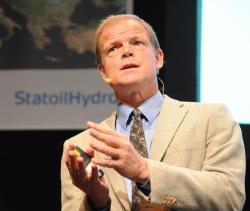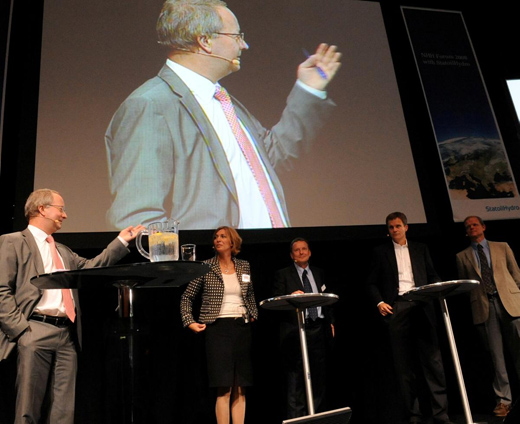"Set a price on CO2"
NHH's climate professor Gunnar S. Eskeland stressed that he does not think StatoilHydro will lead us out of the oil age, and Helge Lund (pictured) painted a picture of an energy sector with increasing complexity, during the first ever NHH Forum.
08.09.2008 - Knut André Karlstad (translated by Jessica Hartenberger)

SKEPTICAL. NHH's climate professor does not think that StatoilHydro will lead us out of the oil era.
Foto: Trond J. Hansen
This Tuesday was the first time Eskeland appeared publically in his new position as climate professor at Norges Handelshøyskole, and both he and Lund focused on the issue of when the oil era ends. Eskeland compared the oil age metaphorically to the Stone Age.
"The stone age did not end because man ran out of stones," he said, and also posed the question of whether or not StatoilHydro will lead the development of alternative energy sources.
"It would be exceptional if a stone owner leads us into a non-stone age," commented the climate professor.
The market is the solution
CEO Helge Lund spoke at NHH for the first time since 2005 on Tuesday, and among other things he stressed that StatoilHydro is investing a great deal into new technology and development of alternative energy sources.
"There will be no realistic alternatives to oil, gas and coal within the next decades," said Lund, but also mentioned:
"Our production has, with good margin, the lowest CO2 emissions per produced unit."
Helge Lund was very clear about the climate problem in his speech:
"Set a price on CO2, then all of the players will have the same incentive to be responsible. There is no dispute between StatoilHydro and Norwegian authorities on this issue. Prime Minister Stoltenberg was very clear that market mechanisms are the only way to solve the CO2 problem.
Merger research
After the merger between Statoil and Hydro, questions were posed about the new company's prioritization of research and development. According to the CEO the R&D budget had increased by 20 percent in one year.
"We are currently investing 65 million kroner. This is equivalent to 196 years of Norges Handelshøyskole's operating costs," explained Lund to the students present in Aulaen.
Together Paul N. Gooderham, previously mentioned Eskeland, and Inger G. Stensaker comprised the panel that commented on and discussed Helge Lund's speech. Stensaker is part of a research group which is studying the merger between Statoil and Hydro.
"That which has been accomplished thus far has been very impressive. But you all are not finished yet," said Stensaker, who emphasized the company's middle managers as the key for success further into the merger process.

CULTURAL UNDERSTANDING. "Explain swimming to someone who cannot swim. Add in geographical distance, language barriers and lack of trust," said Gooderham when he spoke about internationalization.
Foto: Trond J. Hansen
Cultural intelligence
Both Stensaker and Gooderham referred to the Scandinavian leadership model during the debate. One problem for Norwegian companies that operate internationally is a lack of understanding in relation to cultural differences. Norwegian leaders are less hierarchical and have an operational focus in comparison to many other countries. To succeed, according to Gooderham, one needs cultural intelligence.
"The Norwegian model has functioned well in a Norwegian context. But it cannot function outside Norway without considerable 'translations'", he said.
Important meeting place
Rector Jan I. Haaland led the academic proceedings in Aulaen, and when the first NHH Forum was over, he was pleased with the result.
"I am very well pleased with the arrangement. I think we received good insights into some of the large challenges that a company like StatoilHydro faces, and nice illustrations on how challenges like this can be understood and analyzed from an academic perspective. There were also many good and relevant questions from the students in attendance, and as far as I can judge the small group discussions in the cafeteria afterward were lively. So all in all, the first NHH Forum was exactly what we had hoped it would be. I really appreciate that Helge Lund and StatoilHydro were willing to expend so much time and resources on an arrangement like this," Haaland tells Paraplyen.
The idea is that the NHH Form is to be established as an annual arrangement, in collaboration with the economic industry. This year's Forum will be evaluated before plans begin for next year's conference.
"I strongly believe that there is good reason to move forward with a concept like this. We need good meeting places where the business community and academia in conjunction with one another can focus on important challenges and problems, and the NHH Forum is meant to be such a meeting place," says Haaland.

PANEL DEBATE. CEO Helge Lund and the academic panel from NHH answered the questions that the audience posed. From the left: debate leader and rector Jan I. Haaland, Inger G. Stensaker, Paul N. Gooderham, Helge Lund and Gunnar S. Eskeland.
Foto: Trond J. Hansen
|

